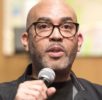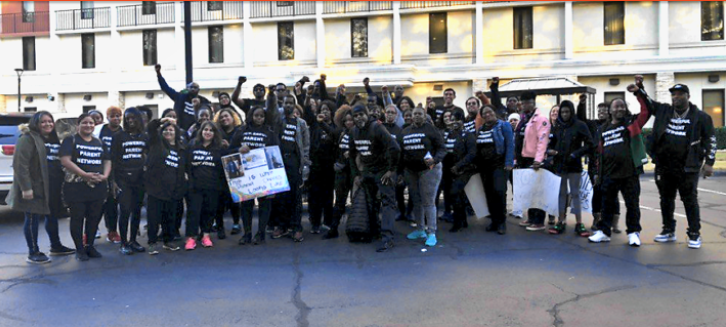
 Chris Stewart’s “radicalization” on education reform came after he was elected to the Minneapolis Public Schools Board of Education in 2007 and witnessed what he saw as countless systemic inequities plaguing low-income families of color.
Chris Stewart’s “radicalization” on education reform came after he was elected to the Minneapolis Public Schools Board of Education in 2007 and witnessed what he saw as countless systemic inequities plaguing low-income families of color.
His recent report, The Secret Shame, How America’s Most Progressive Cities Betray Their Commitment to Educational Opportunity for All, finds that “…the cities we would most assume to be capitals of ’equity’ are in fact citadels of racial, economic and educational injustice.”
Stewart, chief executive officer of Education Post, has been fighting to change systemic failure for more than a decade. He holds little stock in optimism.
“Optimism is a privilege, not an entitlement,” Stewart says in this podcast with Step Up For Students president Doug Tuthill. “Optimism, false hope, pithy statements … we need to be sober adults and realize we are in the fight of our lives for a generation of kids who are being ill-served by people who say they care that hold power.”
Stewart believes it’s time for education choice advocates to “stop with the fluff” and dig down and fight. That means recognizing the importance of the education reform movement in holding choice-hostile politicians accountable.
Stewart also discusses the education policies of the current Democratic presidential primary contenders. He believes that in catering their education platforms to union leadership in order to win their endorsements, the candidates are alienating core Democratic Party voters.
Is there reason to be optimistic that any of this might change? That question and more on this episode of podcastED.

More than 100 mainly black and Latino parents and education advocates from around the country attended an Elizabeth Warren event in Atlanta Nov. 21 to share how Warren’s recently unveiled education plan shortchanges children of color.
Editor’s note: In this commentary, originally published Nov. 26 on Education Post, Chris Stewart shares his thoughts on Elizabeth Warren’s recent encounter with charter school supporters and expresses gratitude for those individuals who had the courage “to take their grievances directly to the source of political power that seeks to deny them agency and a fair shot at finding options for their youth.”
It must have been mortifying for Democratic presidential hopeful Elizabeth Warren to have a loud group of Black parents—mostly mothers and grandmothers—shout her down at a campaign stop that was meant to highlight the importance of valuing Black women. As they chanted “our child, our choice,” a mantra in support of school choice (and against Warren’s proposed curb to federal charter school funding) she stood immobilized. Ayanna Pressley had to step in with a wagging finger to sternly lecture the protestors.
In that moment the Democrats’ battle over public education was on full display.
This reminds me of Fannie Lou Hamer who in the 1960s brought plain talk to the Democratic party that was ignoring the needs of southern, poor Black folks. The establishment worked all of its angles to silence her. They sent Roy Wilkins, the educated negro from the NAACP, to tell Hamer that she was ignorant and she should leave politics to the people who know best—people like him.
That encounter caused her to cancel her NAACP membership and say, “There ain’t nothing I respect less than the NAACP.” The Southern, poor and country Hamer would not be turned back, belittled, or silenced, even against crazy odds and the most powerful people.
I can’t help but think history repeats itself until we learn from it.
Today, Warren, a wealthy, White woman candidate who once supported and used school choice to her advantage—but now takes her cues from the unions representing America’s Whitest, most female profession—can’t handle the Black folks, so she turns to a surrogate.
That’s where Pressley, a college-educated, middle-class Black woman, whose hard-working mother living on the South Side of Chicago sent her to a prestigious private school that today costs $37,000 a year, eagerly volunteered to play the role of Wilkins.
And these mothers, fathers, grandmothers and guardians, who live in some of the poorest, most incarcerated zip codes in the country, traveled long distances to Atlanta, only to be told they are ignorant, like Hamer.
Those who wish to be president on the Democratic side want the most economically insecure families to wait for better schools. A fix is coming, they promise, like they promised for years. More money, more services, more staff in the same system of miseducation will make it all better. No need for expanding school choices, or for improving and diversifying the teaching profession, or for improving and modernizing our standards and curricula to better serve the needs of each and every child.
Be patient.
But how patient would middle-class people be if their kids were falling years behind in school? What do they do when the system isn’t working for their kids? Warren’s case is instructive. When the public system didn’t work for her son she put him in a private school. Ambitions for higher office have recast her as a champion of public schools who gets her education policy wholesale from unions and Diane Ravitch, the ranking leader of the unreform movement (and another private school parent turned public school zealot).
The education establishment, its unions and the politicians it controls are working to dismantle two decades of progressive education policy that offered families options beyond bureaucratized, politicized and unionized district schools. The public’s sympathy for striking teachers, the universal belief that the biggest problem with schools is lack of money and a general disregard for the experience of marginalized parents makes it an opportune moment to roll back education reforms.
The system is winning.
For now.
In the past few days, I’ve seen too many messages online scandalously demoting the protestors to ignorant nobodies who are being used by White, wealthy people in an attempt to destroy our perfectly amazing district schools. These claims come without the slightest realization of how much they expose many Democrats for being the elitist, racist people they accuse others of being.
While they constantly profess their love for the little guy, leading Democratic candidates constantly throw that little guy under the union bus if it helps their career prospects.
Families like those who make up the Powerful Parent Network—who are purposely redlined into the school districts where the only people who think the status quo is worthy of loyalty are the adults who draw their pensions from those schools—can’t be bamboozled by the system. They can’t sacrifice their children to some sketchy promise of a “public good.”
To be Black in America is a constant struggle for full humanity. Nobody knows that more than the guardians of the faces at the bottom of the well. Nobody knows that more than the mothers of the poor, the grandmothers of the children left behind, the caregivers to those who are Black, Brown, under-resourced, dyslexic, exceptional, medically fragile and academically thirsty in classrooms built on the lowest of expectations.
This week, I’m grateful for those mothers and guardians who boarded buses or planes, made signs and planned chants, and headed out for Atlanta to take their grievances directly to the source of political power that seeks to deny them agency and a fair shot finding options for their youth. I’m grateful that they spoke plainly, in their own vernacular, and made the leaders hear them—because ignoring them before the cameras and bright lights would have shown them for the classist hypocrites they are.
Hamer wanted a fundamental change in the power structure that made sure the underclass has a direct role in the system governing their lives. We can learn from that. Rather than discounting the parents who demand better school options, fair school systems and more resources, leaders should make sure they are seated in the power rooms when agendas are formed.
Warren isn’t alone in ignoring voices in the underclass about public schooling. Her competitors should be called out too. If Democratic candidates for president—indeed, candidates from all parties—wish to be true representatives of all Americans, they will stop taking sides in the education wars, stop pitting parents against each other, and stop acting as if children are less important the moment they enter a charter or non-traditional schools.
As communities across the country rekindle decades-old battles over racial integration, education reform advocate Chris Stewart argues that other efforts to improve schools and create new options for parents shouldn't take a back seat.
Most black parents are realists. There is no evidence that perfect integration will occur soon, but our kids need an education today. With this in mind, it is unnerving to see integration fundamentalists criticizing policies aimed at educating our kids where they are. To them, reforms that assist marginalized communities are a consolation prize for our failure to achieve an idealized picture of Martin Luther King Jr.’s dream community. To us, they’re an imperfect but ultimately useful pathway helping us to navigate our kids through a racist society.
What if the supposed beneficiaries of public school integration aren’t actually pining for it? There is a long line of black intellectual thought that questions the primacy of integration as an educational goal and as a means of cultural health for black children.
W.E.B. Dubois said: “The Negro needs neither segregated schools nor mixed schools. What he needs is Education. What he must remember is that there is no magic, either in mixed schools or in segregated schools. A mixed school with poor and unsympathetic teachers, with hostile public opinion, and no teaching of truth concerning black folk, is bad.”